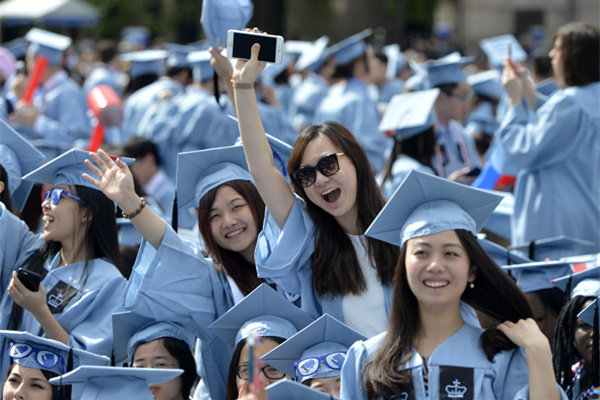
Chinese students celebrate their graduation from Columbia University on May 20, 2016. [Photo/Xinhua]
The novel coronavirus outbreak has increased uncertainties over the future of foreign education, especially because the White House has imposed visa restrictions on students and visiting scholars from China. Also, some universities in the United States have raised the barriers higher for Chinese students seeking admission to some courses, including majors.
China's Ministry of Education has issued advisories warning Chinese nationals of the risks of pursuing studies in countries such as the US and Australia. Surveys show that the pandemic and Sino-US relations, in light of the trade war the US administration has launched against China, have disrupted some Chinese nationals' plans to study abroad.
In addition to the Chinese government's warning about the obstacles to overseas studies, many social media platforms have highlighted the anxieties of students pursuing education abroad. So, for those who plan to study abroad, they need to distinguish facts from rumors and sensationalized reports, and evaluate the real situation on the ground to avoid being overcome by uncertainties and making the wrong choice.
As a matter of fact, ever since China sent the first batch of students to study abroad in 1872, risks and uncertainties-big and small-have always been an integral part of overseas studies, the novel coronavirus outbreak being the latest one. The right thing to do is to weigh all the options and make the right choice.
The history of Chinese nationals studying abroad for about a century and a half shows the number of Chinese overseas students has increased and declined-in a wave like pattern-according to changes in domestic and international situations.
In the wave trough, Chinese students studying abroad have generally seen a big drop in numbers during uncertain or unfavorable international situations. And apart from some exceptions, the value of overseas studies during uncertain domestic times has been much higher compared with upbeat times. In the more than 40 years since the launch of reform and opening-up, the number of overseas Chinese students has kept increasing with each passing year, reaching the peak in recent years. But thanks to the US' trade war against China and the coronavirus outbreak, the number is expected to decline.
The new and emerging challenges could shake the resolve of some applicants seeking to study abroad. And those who are more determined to cross the hurdles to fulfill their dream of studying abroad will be more competitive in the job market and play a bigger role in advancing social development.
As for the answer to the question whether it would be a good choice to study overseas after the pandemic outbreak, no matter how drastically the external environment changes, one can fruitfully pursue a long-term goal only by making the right choice after carefully weighing the pros and cons.
After all, life is a journey to overcome difficulties to reach a goal.
The author is a senior researcher at the National Institute of Education Sciences.
The views don't necessarily represent those of China Daily.


